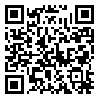Volume 13, Issue 3 (May & Jun 2022)
BCN 2022, 13(3): 285-294 |
Back to browse issues page
Download citation:
BibTeX | RIS | EndNote | Medlars | ProCite | Reference Manager | RefWorks
Send citation to:



BibTeX | RIS | EndNote | Medlars | ProCite | Reference Manager | RefWorks
Send citation to:
Goshvarpour A, Goshvarpour A, Abbasi A. A Predictive Model for Emotion Recognition Based on Individual Characteristics and Autonomic Changes. BCN 2022; 13 (3) :285-294
URL: http://bcn.iums.ac.ir/article-1-745-en.html
URL: http://bcn.iums.ac.ir/article-1-745-en.html
A Predictive Model for Emotion Recognition Based on Individual Characteristics and Autonomic Changes
1- Department of Biomedical Engineering, Faculty of Electrical Engineering, Imam Reza International University, Mashhad, Razavi Khorasan, Iran.
2- Department of Biomedical Engineering, Faculty of Electrical Engineering, Sahand University of Technology, Tabriz, Iran.
2- Department of Biomedical Engineering, Faculty of Electrical Engineering, Sahand University of Technology, Tabriz, Iran.
Abstract:
Introduction: Studies have repeatedly stated the importance of individual differences in the problem of emotion recognition. The primary focus of this study is to predict Heart Rate Variability (HRV) changes due to affective stimuli from the individual characteristics. These features include age (A), gender (G), linguality (L), and sleep (S). In addition, the best combination of individual variables was explored to estimate emotional HRV.
Methods: To this end, HRV indices of 47 college students exposed to images with four emotional categories of happiness, sadness, fear, and relaxation were analyzed. Then, a novel predictive model was introduced based on the regression equation.
Results: The results show that different emotional situations provoke the importance of different individual variable combinations. The best variables arrangements to predict HRV changes due to emotional provocations are LS, GL, GA, ALS, and GALS. However, these combinations were changed according to each subject separately.
Conclusion: The suggested simple model effectively offers new insight into emotion studies regarding subject characteristics and autonomic parameters.
Methods: To this end, HRV indices of 47 college students exposed to images with four emotional categories of happiness, sadness, fear, and relaxation were analyzed. Then, a novel predictive model was introduced based on the regression equation.
Results: The results show that different emotional situations provoke the importance of different individual variable combinations. The best variables arrangements to predict HRV changes due to emotional provocations are LS, GL, GA, ALS, and GALS. However, these combinations were changed according to each subject separately.
Conclusion: The suggested simple model effectively offers new insight into emotion studies regarding subject characteristics and autonomic parameters.
Type of Study: Original |
Subject:
Computational Neuroscience
Received: 2016/03/15 | Accepted: 2020/10/11 | Published: 2022/05/1
Received: 2016/03/15 | Accepted: 2020/10/11 | Published: 2022/05/1
Send email to the article author
| Rights and permissions | |
 |
This work is licensed under a Creative Commons Attribution-NonCommercial 4.0 International License. |








